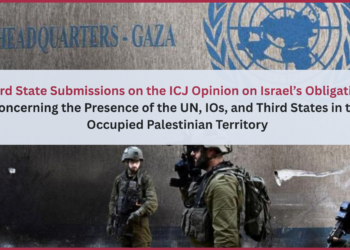Economic Responsibilities of Third States in light of the ICJ Advisory Opinion and the Genocide Convention
Date and Time: Wednesday, 2 July 2025, 14:30 to 15:30
Location: Room XXI, Palais des Nations, Geneva
Organised by: The Independent Commission for Human Rights – Palestine, Law for Palestine and Human Rights Watch
Since October 2023, Gaza has endured an unprecedented genocidal campaign by Israel, resulting in killing over 50,000 Palestinians and devastating all aspects of civilian life. Yet this violence does not exist in a vacuum. It is rooted in a decades-long abusive occupation, which the ICJ has found to be illegal, apartheid, and domination over the Palestinian people as a whole, which the UN Special Rapporteur on the situation of human rights in the Palestinian territories occupied since 1967 has identified as “a century-long project of eliminatory settler-colonialism in Palestine”.
The ICJ Advisory Opinion of July 2024 marked a turning point in the international legal discourse. It reaffirmed the illegality of Israel’s presence in the occupied Palestinian territory and clarified the obligations of third states: non-recognition, non-assistance, and active cooperation to bring the unlawful situation to an end. These findings not only challenge the political status quo but demand clear legal consequences for states and private actors that are complicit in Israel’s long-standing grave abuses across the OPT.
Moreover, states have an obligation to address the urgent situation in Gaza, which a range of Palestinian and international human rights groups and other legal experts have found to amount to genocide. In this context, economic relations -both public and private- have become central to sustaining and enabling Israeli violations of international law. These include investments, arms transfers, supply chains, and financial services supporting Israel’s genocidal campaign and atrocities in Gaza.
This side event will take place in light of the coming report by the UN Special Rapporteur on the situation of human rights in the Palestinian territory occupied since 1967, which focuses on private actors’ complicity in the ongoing atrocities. Building on this report, the event will address how third states and corporate actors bear legal responsibility not only through direct complicity but also through their failure to regulate, prevent, and cease economic engagement with illegal conduct.
Objectives
This event aims to extend the legal and political conversation on accountability -beyond perpetrators to the enablers- by focusing on the economic dimension of the occupation, apartheid, and genocide. It will examine:
- Responsibility of third states to follow their economic obligations in light of the ICJ AO.
- Responsibility of third states to regulate corporations under their jurisdiction that are complicit in international crimes in the oPt.
- Legal accountability for businesses contributing to or profiting from international crimes, including arms companies, financial institutions.
- Existing legal tools and precedents under international and domestic law to hold private and public actors accountable for their economic entanglement with unlawful conduct.
This conversation aims to complement rather than replicate existing discussions by sharpening the focus on the economic architecture of impunity and the failure of states to fulfil their obligations under international law to prevent and remedy such complicity.
Speakers:
- Francesca Albanese, UN Special Rapporteur on the situation of human rights in the OPT.
- Wesam Ahmed, Head of the Center for Applied International Law, Al Haq.
- Anisha Patel, Governing Council Member, Law for Palestine.
- Daan de Grefte, Senior Legal Officer, European Legal Support Center.
Moderator:
- Dr. Ammar Dwaik, Director General – The Independent Commission For Human Rights – Palestine Economic Responsibilities Genocide
The event will be live-streamed on YouTube





